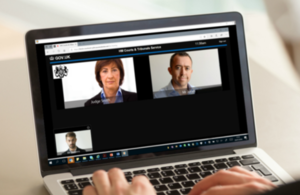Results of fully-video hearings pilot published
Court users taking part in the first fully-video hearings found them convenient and easy to understand, an independent report published today reveals.

- Fully-video hearings tested for the first time as part of government’s £1bn court reform programme
- Evaluation finds they were easy to understand and welcomed by users
- Technological improvements will be made going forwards
Working closely with the judiciary, the pilot, involving eight cases, ensured hearings were conducted as in a physical courtroom and aimed to test people’s experiences and the support required in the early days. The small-scale trial was carried out in the first-tier tax tribunal and was the first time all parties could attend via video. Hearings took place over the internet, with each participant logging in from a location of their choice using their own equipment and, for the purposes of the pilot, the judge located in the court room.
Independent evaluation from the London School of Economics, published today (13 September 2018), shows that the trial was a success among appellants who welcomed the chance not to have to travel to a court room - with one person living abroad reporting that they avoided the need to fly to the UK and a new mother welcoming the chance to stream from home. The research – “Implementing Video Hearings: A Process Evaluation” – revealed people found hearings clear, easy to navigate and user-friendly.
Justice Minister, Lucy Frazer, said:
Fully-video hearings have huge potential for those who find it difficult to travel to a courtroom and this trial is a welcome first step.
Of course, we are still in the early stages of testing the technology, but the findings in this report will help us drive the innovation needed to make video hearings a success.
Lessons will now be learnt from the pilot scheme including making fully-video hearings available for more users by improving the technical product; ensuring technology is robust and reliable; and ensuring the level of pre-hearing support is right at each stage.
The move is part of the Government’s £1 billion investment to modernise the court service, making it swifter, simpler and easier to access for everyone.
Video technology is already used in criminal courts to allow some victims and witnesses to give evidence without having to come face to face with the accused.
Following the report, HMCTS will continue to work with the judiciary and run further pilots later in the year.